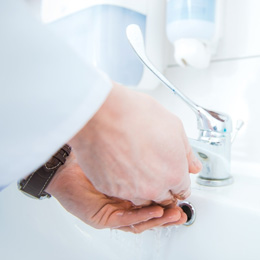Sales of the U.S. market for janitorial cleaning chemicals grow at a slow, but steady pace from 2015-2017, to some extent matching population growth in the country. To thrive in this mature market, janitorial cleaning product suppliers need a deep understanding of end users’ needs and market dynamics to bring innovation and capture profitable niches. In this article, we look into the key changes and challenges for jansan market suppliers in 2017.
Contract cleaners continue to expand their business, trying to gain a new client base beyond office buildings. Education is not the largest in the jansan market, but is a highly desirable one as schools are characterized by a high loyalty rate; however, budgets at schools are very tight, and schools are often asked to do more with less. Contract cleaners can provide schools with more cost-effective janitorial cleaning staff at half the loaded hourly cost of an employed school custodian. Several education end users note that contract cleaners also ensure the cleaning is completed on time, in comparison to an employed school custodian who may be absent for sick leave or vacation. However, schools and parents are also skeptical to change the trusted and experienced janitor whom they know personally with contract cleaners with staff that changes often and might not have been trained with the proper cleaning techniques necessary to prevent outbreaks at schools. Moreover, school district unions are, understandably, publicly hostile to outsourcing janitorial work to contract cleaners.
The last time we conducted this research in 2014, fast-casual restaurants were a rising star of the janitorial segment, driven by rapid expansion of new stores. While consumers’ interest in fast-casual restaurants continues to be high, this segment is not opening new locations at as fast a pace, resulting in a slowdown in sales growth of janitorial cleaning products to the fast-casual restaurant market.
Healthcare facilities continue to be important users of janitorial cleaning chemicals due to high hygienic standards and advanced sanitation practices. Environmental services managers at hospitals are always seeking ways to reduce the chances of patients contracting healthcare acquired infections and therefore, sanitation and disinfecting of hospitals is crucial. Nursing homes, in turn, are projected to grow faster, driven by the aging population and increasing popularity of professional elder care as the way of taking care of aging family members.
Operating under tight budget constraints, many small businesses are purchasing jansan chemicals from office supply retailers and warehouse clubs, as these channels offer convenience and value pricing, resulting in growth of jansan products sold through these retail channels. However, competitors started to claim that these retail channels do not have enough expertise to train customers with proper, effective and safe cleaning practices, and, overall, can only deliver small quantities of needed products. This has resulted in office supply stores, such as Staples, hiring field agents who can train customers in the best cleaning practices as needed. Staples Advantage, the online site of Staples office supply stores, continues to be a strong channel of distribution for janitorial cleaning products among several end users.
In-depth assessment of industry trends and challenges in the mature U.S. market for janitorial cleaning products will be covered in the ninth edition of the Janitorial and Housekeeping Cleaning Products: U.S. Market Analysis and Opportunities report. Based on over 1,000 end-user surveys and 70 structured interviews with suppliers, distributors, and trade associations, Kline will examine critical success factors and buying dimensions in the market channel for jansan cleaning products in all the key end-use segments. Contact our team to learn how we can meet your market research needs.

